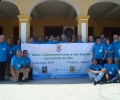Message for the Sunday of the Sea </ h3>
Rome asks for more resources to fight trafficking and human exploitation </ h2>
Appeal to European governments and those of origin of migration flows </ h4>
The Pontifical Council for Pastoralism of Emigrants and Traveling </ b> has today published its Message for Sunday March </ b> (July 12) signed by Cardinal Antonio Maria Vegliò and the Bishop Joseph Kalathiparambil, respectively president and secretary of that dicastery. Follow the full text:
“To transport merchandise and products around the world, the global economy relies heavily on the maritime industry, supported by a work force of around 1.2 million sailors who, in The seas and the oceans govern the ships of all kinds and dimensions and often face the powerful forces of nature.
Due to the fact that the ports have been built far from the cities and because of the speed of loading and unloading of merchandise, the crews of these ships are invisible “people </ b>. As individuals we do not recognize the importance and benefits that the maritime profession offers to our lives, but we are aware of their work and their sacrifices only when there is a tragedy.
Despite the technological development that makes life easier on board and facilitates communication with loved ones, sailors are forced to spend long months in a closed space, far from their families. Unfair and restrictive rules often prevent them from shutting down when they are in port </ b> and the continuing threat of piracy on numerous sea lanes adds stress during navigation. We are convinced that the ratification and entry into force of the Convention on Maritime Labor (2006) in an increasing number of countries, accompanied by effective controls by each government, will translate into a tangible improvement of the labor conditions aboard all the ships.
The current situation of war, violence and political instability in various countries has created a new phenomenon that is affecting the maritime transport sector. Since last year, together with the coastal Guards and naval forces of Italy, Malta and the European Union, merchant ships that travel through the Mediterranean Sea actively participate in what has become a ransom everyday of thousands and thousands of emigrants, who seek to reach especially the Italian coasts in all types of boats crammed and inappropriate for navigation.
From time immemorial the sailors fulfill the obligation to provide assistance to the people in danger in the sea, in any condition. However, as has been pointed out by other maritime organizations, for merchant ships rescuing migrants at sea represents a risk to the health, well-being and safety of their crews. Commercial vessels are designed for the transport of goods (containers, oil, gas, etc.), while on-board services (accommodation, kitchen, bathrooms, etc.) are built according to the limited number of members of the crew Therefore, these ships are not equipped to provide assistance to a large number of migrants.
Sailors are professionally qualified for their work and are trained to handle some emergency situations, but the rescue of hundreds of men, women and children who are frantically trying to get aboard to be safe, is something for which no training course for the Maritime school has prepared them. On the other hand, the effort made to save as many people as possible and, sometimes, the vision of lifeless bodies floating in the sea, represent a traumatic experience that leaves the crew members exhausted and psychologically stressed, to the point of needing specific psychological and spiritual support.
On the Sunday of the Sea, as a Catholic Church, we want to express our gratitude to the sailors in general, for their fundamental contribution to international trade. This year in particular, we want to recognize the great humanitarian effort made by the crews of merchant ships that, without hesitation, and sometimes at risk for their lives, have been involved in numerous rescue operations, saving the lives of thousands of emigrants.
Our recognition is also addressed to all priests and volunteers of the Apostolate of the Sea for their daily commitment to the service of the people of the sea; Its presence in the ports is a sign of the Church in their midst and shows the compassionate and merciful face of Christ.
In conclusion, while we call European governments and those of origin of migration flows as well as international organizations to collaborate in the search for a lasting and definitive political solution that end the instability that exists in those countries, we also request that more resources be committed not only for search and rescue missions, but also to prevent trafficking and exploitation of people fleeing conflict and poverty.
07/01/2015





